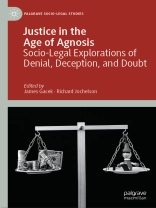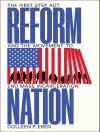This book seeks to further the understanding of the human experience of coerced and forced ignorance on social, human rights and criminal justice related topics, drawing together scholars from multiple, disciplinary fronts. It argues that people in our social world are forced or coerced through either implicatory or interpretive denial that is normalized through specific cultural and social mechanisms by which we refer to this as non-knowledge or
agnosis. There has also been a lack of scholarship which examines how human victimization and power intersects by and through the systematic orchestration of forced ignorance and doubt upon daily human life. This book’s focus is an examination of the ways in which people find themselves in social spaces without empirical clarity and understand that absence as satisfaction, stability, or perhaps even pleasure. It discusses a range of topics, including for example people’s sense of relative safety, despite empirical realities suggesting otherwise. This book seeks to make visible the role of ignorance in governing society, highlighting how the late modern human experience in a post-World War II human rights era subsumes, subverts, and sublimates the complex relationship between knowledge and denial; the empirical gulf between knowledge and resistance may indeed breed complicit bliss.
Innehållsförteckning
Section I – Introduction.- 1. Doctoring, Distorting, Denying, Doubting: Ignorance Production in the Age of Agnosis. By James Gacek and Richard Jochelson.- Section II – Punishing places and ignorance production.- 2 . “You Just Roll with the Punches”: The Manufacturing of Consent to Violence in Professional Ice Hockey. By Martine Dennie.- 3. Agency, Resistance, and Alienation: The Carceral Geographies of Art in the American Prison System. By Adam C. Morse.- Section III – Of Medical Doctors and ‘Spin’ Doctors: The socio-medical politics of ignorance production.- 4.Pandemic, epidemic, and systemic issues in US healthcare: Discussing the dynamics of a hybrid model and its impact on varied communities. By Amny Shuraydi and Amin Asfari.- 5. Gone, but not Forgotten: The Agnotological Necropolitics of Inquest Fatality Reports. By James Gacek, David Ireland, and Richard Jochelson.- Section IV – Towards Truth? Epistemic (in)justice in the Age of Agnosis.- 6.Faded by Design: Manufacturing Agnosis of Settler-Colonialism in an Era of Indigenous Truth and Reconciliation in Canada. By Shawn Singh and Brandon Trask.- 7.Fragmenting Epistemologies: Towards Philosophical Foundations for Machine Learning in Law. By Katie Szilagyi.- Section V – Framing Family and Falsehoods: The legal and illegal production of ignorance.- 8.Mothering Under the Snow: Uncovering Mother work Under the Whitewashed Construct of the Good Mother. By Rebecca Jaremko Bromwich.- 9. A ‘need-to-know’ basis. By Charles Louisson.- Section VI – Proving Facts and Vax: The Age of Agnosis in the Age of COVID-19.- 10. Call it Democracy: The slippage amongst rights, laws, and values in the pandemic era. By Brandon Trask.- 11.Shortfalls of the Bioethical Approach to COVID-19: Vaccine Hesitancy, the Right to Choose and Public Health Management in Canadal. By Shawn Singh.- 12.Conclusion.
Om författaren
James Gacek is Associate Professor in the Department of Justice Studies at the University of Regina, Canada.
Richard Jochelson is Professor in the Faculty of Law at the University of Manitoba, Canada.











